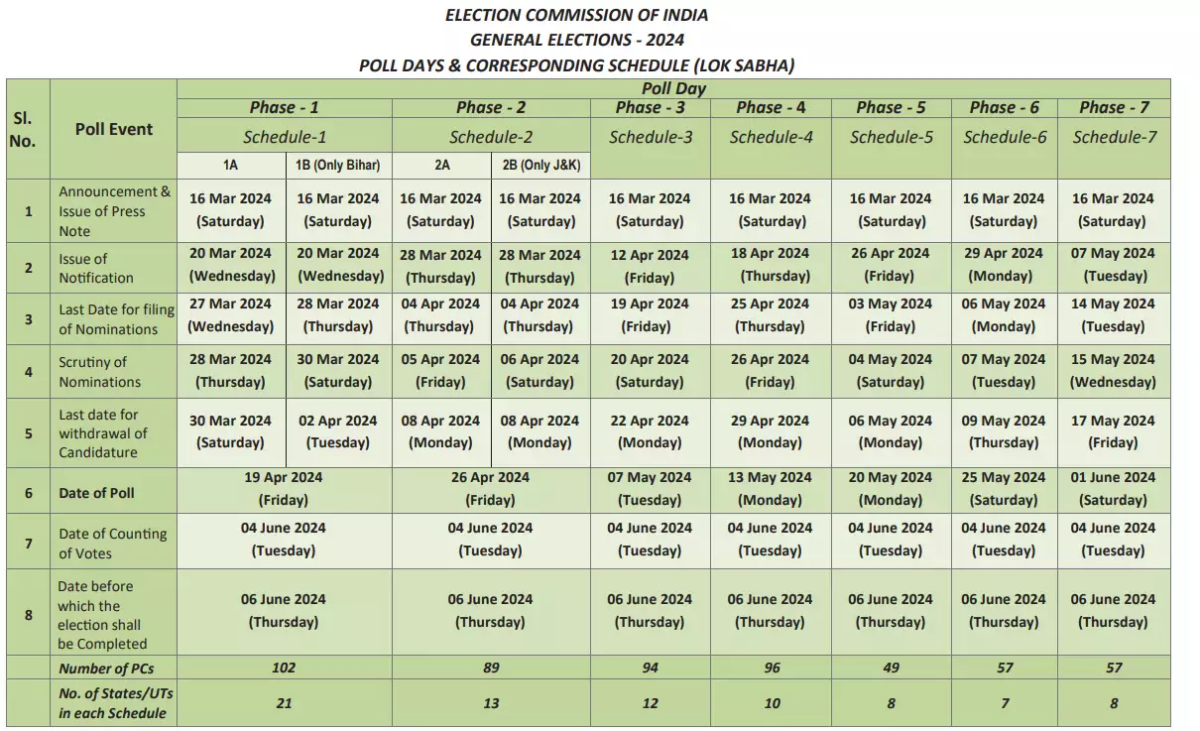The nomination process for the 2024 Lok Sabha elections has commenced, heralding a pivotal phase in India’s democratic framework. This process is fundamental to the electoral journey, defining how candidates can officially enter the fray to represent their constituencies in the esteemed Lok Sabha. Below is a detailed walkthrough of the nomination process, highlighting its key components and procedures:
Table of Contents
Eligibility Criteria:
· Candidates must be Indian citizens.
· They should be at least 25 years old.
· They must be registered as voters in the current electoral roll.

Nomination Options:
· Candidates have the choice to be nominated by a recognized political party.
· They can also opt to contest as independent candidates, showcasing the diversity of political participation in India.
Submission of Nomination Forms:
· The nomination process kicks off immediately after the Election Commission of India issues a gazette notification for each phase of the elections.
· Nomination forms, available for download, must be completed and submitted to the concerned Returning Officer and Chief Electoral Officer.
· The deadline for submission is typically 3 pm on the last date for making nominations.
Online Nomination Option:
· To streamline the process, candidates can utilize the Suvidha Candidate App, available on Android and iOS platforms, to file their nomination forms online.
· After online submission, candidates need to schedule a visit to the Returning Officer, ensuring a smooth transition from digital to physical submission.
Affidavit Submission:
· Candidates must submit an affidavit in Form 26, providing detailed information about their background, including any criminal antecedents, assets, liabilities, and educational qualifications.
· This affidavit is a crucial document that enhances transparency and accountability among candidates.
Taking Oath:
· Candidates are required to take an oath in the prescribed format, as per the Constitution, before the Returning Officer or an authorized person.
· This oath signifies the candidate’s commitment to upholding democratic values and principles.
Security Deposit:
· A security deposit is mandatory for candidates, with the amount set at ₹25,000 for general candidates and ₹12,500 for candidates from scheduled castes or tribes.
· Documentary proof may be required to establish eligibility for the deposit amount.
Candidate Affidavit Portal:

· The online candidate affidavit portal allows public access to comprehensive candidate profiles, including photos and affidavits, facilitating informed decision-making among voters.
This detailed overview underscores the meticulous procedures involved in the nomination process, ensuring fairness, transparency, and integrity in India’s electoral system.
Participating States and Union Territories
On March 20, the Election Commission of India (ECI) took a significant step by releasing a gazette notification for the 102 parliamentary constituencies distributed across 17 States and 4 Union Territories that will undergo polling in the first phase of the 2024 Lok Sabha elections. The polling for these constituencies is scheduled to take place on April 19, marking the initiation of this crucial electoral process.
Phase 1
The States and Union Territories included in Phase 1 are Arunachal Pradesh, Assam, Bihar, Chhattisgarh, Madhya Pradesh, Maharashtra, Manipur, Meghalaya, Mizoram, Nagaland, Rajasthan, Sikkim, Tamil Nadu, Tripura, Uttar Pradesh, Uttarakhand, West Bengal, Andaman and Nicobar Islands, Jammu and Kashmir, Lakshadweep, and Puducherry. As per the electoral schedule, the last date for filing nominations in these regions is March 27, Wednesday.
The 18th Lok Sabha elections are set to kick off with the closure of nominations on Wednesday, March 27. The first phase, scheduled for April 19, will witness voters in 102 Lok Sabha constituencies exercising their democratic right alongside Assembly elections in Arunachal Pradesh and Sikkim.
Political alliances and candidate line-ups are drawing attention as the 2024 Lok Sabha elections unfold. The NDA has assigned 77 seats to the Bharatiya Janata Party (BJP) and 23 seats to other coalition members for the initial phase. Meanwhile, the INDIA bloc has unveiled its candidate roster, with 57 nominees from the Indian National Congress (INC) and 42 seats allocated to allied parties. Of particular interest is ex-BJP MLA Prahlad Gunjal’s entry into Congress, poised to contest against Lok Sabha Speaker Om Birla for Rajasthan’s Kota seat.

Phase 2
Phase 2 of the 2024 Lok Sabha elections brings further energy to the electoral landscape. With 88 Parliamentary Constituencies spread across 12 States/Union Territories, including a portion of Manipur (Outer Manipur), scheduled for polling on April 26, 2024, this phase marks a crucial stage in India’s democratic process. The nomination process for all 12 States/UTs in Phase 2 must be completed by April 4, 2024, followed by scrutiny on April 5, 2024, for most regions, while Jammu & Kashmir’s scrutiny is set for April 6, 2024. Noteworthy is the unique situation of Outer Manipur’s Parliamentary Constituency, which will undergo phased polling due to its distinct assembly constituency distribution.
Conclusion
The 2024 Lok Sabha nomination process marks a key stage in Indian democracy, offering diverse candidacy options. As Phase 1 nominations close, political strategies unfold, reflecting broad electoral engagement. Phase 2 nominations open, sustaining democratic momentum for voters’ pivotal role in shaping India’s political landscape.



